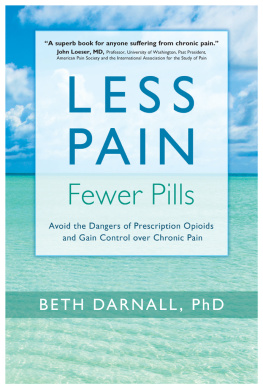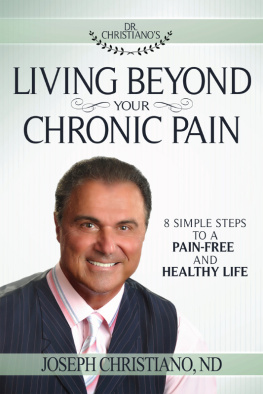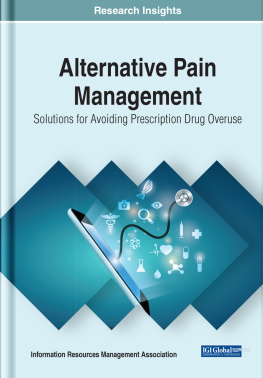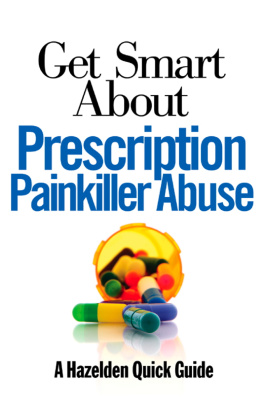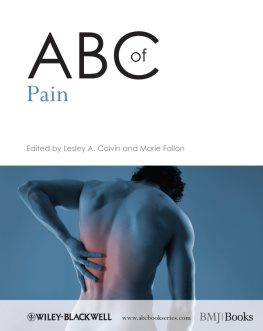


Prescription Drug Abuse
Copyright 2013: Mark J. Estren
ISBN: 978-1-57951-179-1
Published by
Ronin Publishing, Inc.
PO Box 22900
Oakland, CA 94609
www.roninpub.com
All rights reserved. No part of this book may be reproduced or transmitted in any form or by any means, electronic or mechanical, including photocopying, recording, or by any information storage and retrieval system, without written permission from the author or the publisher, except for the inclusion of brief quotations in a review.
Production:
Cover: Brian Groppe
Book design: Beverly A. Potter
Editor: Beverly A. Potter
Credits:
Page 13: Photo by Darren Lewis.
Page 37: Courtesy National Cancer Institute.
Page 63: Photo by Bill Branson, courtesy National Cancer Institute.
Page 75: Photo by Vera Kratochvil.
Page 99: Photo by Linda Bartlett, courtesy National Cancer Institute.
Page 121: Courtesy National Library of Medicine.
Library of Congress Card Number: 2013940511
Distributed to the book trade by PGW/Perseus
In Memory of Dr. G. S. Goldman
My emphasis on the importance of putting patients needs first even in the face of an admitted societal problem reflects the influence of my father-in-law, psychoanalyst George S. Goldman, M.D. (1906-2008). He and I share a Columbia University connection: I earned my masters in journalism from Columbia, while George was the longtime Director of the Columbia University Psychoanalytic Clinic for Training & Research.
As co-editor in 1965 of Developments in Psychoanalysis at Columbia University, George wrote with mild disapproval of the reluctance of many analysts to accept change, looking ahead to a new generation which will shape and mold the future, young psychoanalysts who would maintain their flair for the experimental and exploratory and who have learned the necessity and appreciation of tolerancetolerance of differences with which they disagree, and tolerance amongst their critics.
In the 21st century, where tolerance so often seems quaint, Georges hopeful views are worth remembering, applicable as they are not just to psychiatry, not just to medicine, but to human relationships in general. George understood the importance of listeningsomeone who practiced psychoanalysis until age 85 would have to!and of flexibility, but also the importance of knowing when not to be flexible. He never compromised his focus on patients or his belief that the efficacy of talk therapy was far greater than that of behavior-modifying medications. He was not happy to see psychoanalysis moving toward a medication-focused modeland would not be surprised at the collateral damage that prescription drugs have inflicted on society.
Other Books by Dr. Mark J. Estren
A History of Underground Comics
Statins: Miraculous or Misguided?
Healing Hormones
Table of Contents
W hile most major causes of preventable death are declining in the United States, drugs are an exception. The death toll from drugs has doubled in the last decade: they now claim a life every fourteen minutes. Drugs kill more people than traffic accidents.
Fueling the surge in deaths are prescription pain and anxiety drugs that are potent, highly addictive and especially dangerous when combined with one another or with other drugs or alcohol. Among the most commonly abused are OxyContin, Vicodin, Xanax, Soma and Fentanyla painkiller that comes in the form of patches and lollipops and is a hundred times more powerful than morphine. These drugs now cause more deaths than heroin and cocaine combined. And they are almost certainly in your medicine cabinet.
At some point, everyone needs pain medicinefrom aspirin or Tylenol to prescription-strength opioids. At some point, everyone suffers from anxietyin many cases, seriously enough to need prescription-strength medicines. But the people using the medicines, and sometimes the doctors prescribing them, do not know all the drugs dangers. And in this case, what you dont know can hurt youeven kill you.
Predictably, the government has stepped in. The result is that patients have been caught between the proverbial rock and a hard place. More than one-third of Americans have chronic pain and need medicines that can potentially be abused. Because of government regulations and restrictions, they may not be able to get those drugs; if they do get them, they are at risk of becoming addicted. More than one-fifth of Americans take at least one drug for a psychological disorderand here, too, the desperately needed medicines may not be available, and can be dangerous when patients are able to obtain them.
W hat you dont know can hurt youeven kill you.
The stories of prescription-drug fatalities are heartrending. Overdose victims range in age and circumstance from teenagers who pop pills to get a heroin-like high to middle-aged working men and women who take medications prescribed for strained backs and bad knees and become addicted. A 19-year-old Army recruit, who had just passed his military physical, died after he took a handful of Xanax and painkillers while partying with friends. A groom, anxious over his upcoming wedding, overdosed on a cocktail of prescription drugs. A teenage honors student overdosed on painkillers that her father had left in his medicine cabinet from a surgery years earlier. A toddler was orphaned after both parents overdosed on prescription drugs a few months apart. A grandmother suffering from chronic back pain apparently forgot shed already taken her daily regimen of pills and ended up double dosingand dying.
The Greater Danger
IN SOME WAYS, prescription drugs are more dangerous than illicit ones, because users dont have their guard up. People feel they are safer with prescription drugs because they come from pharmacies and are prescribed by doctors. Younger people believe they are safer because they see their parents taking them. These medicines dont have the same stigma as street narcotics.
These drugs do enormous good, which rarely gets as much attention as the relatively small amount of harm they dowhich, of course, is not to say that the harm is small to families affected. Because news reports focus on the exceptionsthe addicts, the abusers, the people who die from legal medicationsthe media miss a much larger and societally more significant situation. Just outside the headlines and off the front pages are stories that tug even harder at the heartstrings than ones about overdoses and unwarranted deaths: people in terrible pain who cannot get legal relief because the government wont allow them to have it; doctors trying to help desperate patients and, as a result, finding themselves branded as drug dealers; pharmacists refusing legitimate prescriptions out of fear that the government will target them for pushing pills.
Next page


